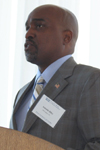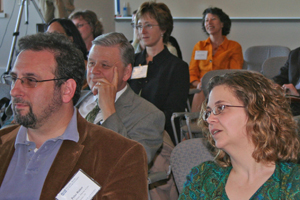May 6, 2009 – The lack of a form can close the courthouse door to a citizen.
In 2007, Wisconsin Judicare staff attorneys Judith Stern and Kimberly Haas met with the Marathon County family court commissioner to discuss how pro se litigants -- confused by the paperwork of a stipulated divorce -- have contributed to stalled litigation and an overloaded docket.
At the 2009 Wisconsin Equal Justice Conference on April 28 in Madison, Haas and Stern explained the solution: court-ordered pretrial conferences at which litigants are instructed on how to proceed and their paperwork is reviewed. Surveys of these pro se parties upon completion of the process show considerable more satisfaction with the legal system.
Stern and Haas offered just one of the many stories of the innovation and creative collaborations across professions aimed at improving access to the courts and ensuring the rights of low- to moderate-income people. Other speakers addressed the use of technology to deliver legal help to rural residents, the role of a lawyer in facilitating medical care, the connection between a driver’s license and keeping a job, and more.

Antonio Riley, Wisconsin Housing and Economic Development Authority executive director, was the luncheon speaker. Riley spoke of his agency’s efforts to improve lending to disadvantaged communities and steps Wisconsin has taken to mitigate the foreclosure crisis.
Antonio Riley, the executive director of the Wisconsin Housing and Economic Development Authority (WHEDA), delivered the keynote address. Riley spoke of his agency’s efforts to improve lending to disadvantaged communities and steps Wisconsin has taken to mitigate the foreclosure crisis.
Milwaukee County Circuit Judge Richard Sankovitz acknowledged that just the roughly 100 conference participants alone could not serve the 2 ½ million people in need in Wisconsin. Accordingly, he urged attendees to circulate their knowledge widely through face-to-face encounters with neighbors, proposals tailored to the interests of particular organizations, and the internet.

More than 130 judges, lawyers, and other legal professionals attended the 2009 Wisconsin Equal Justice Conference on April 28 in Madison.
“Go tell others what you do so that they – even if they don’t join themselves – will tell others,” Sankovitz said.
The 2009 Wisconsin Equal Justice Conference brings together community representatives committed to ensuring civil equal justice for the poor and disadvantaged. The conference is organized by the State Bar of Wisconsin’s Legal Assistance Committee.
